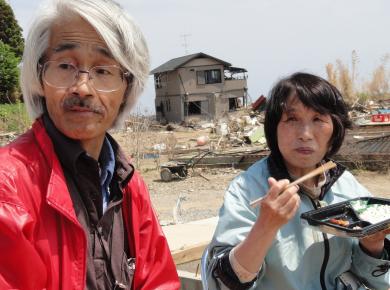Posted: July 31, 2012
Japan—Assistance to residents of temporary housing is one way that Japan Mennonite Fellowship is focusing its ongoing work of relief assistance following the March 2011 earthquake and tsunami.
By the end of December, many shelters had closed and affected people had to move into temporary housing as the first step to independence, which meant that provision of food and daily necessities was stopped. Those affected can live in temporary housing for only two years.
“But the needs of those who are entering temporary housing are diverse,” commented Hiroshi Minegishi, pastor of Kesennuma First Bible Baptist Church on the island of Hokkaido. “Many people, for example, the unemployed, the elderly and persons with disabilities, still need food and every day goods.”
As one of its projects, Japan Mennonite Fellowship decided to help the people from Kesennuma First Bible Baptist Church which was completely leveled by the tsunami. When the tsunami struck, pastor Minegishi was fleeing by car with his wife and daughter. He escaped with only the clothes on his back, which included a red jacket. The red jacket has now become his trademark.
Aid so far has included food distribution to the 153 families in temporary housing. Food was assembled in a temporary community hall in a residential area. A five kilo sack of rice had a label with the names of both the local church and Japan Mennonite Fellowship.
Assisting Japan Mennonite Fellowship in the aid initiative in Kesennuma were members of Hiroshima Mennonite Church. Japan Mennonite Fellowship, which represents four MWC member churches in Japan, formed the East Japan Great Disaster Relief Assistance Committee in May 2011 to coordinate response to the earthquake and tsunami disaster.
MWC release, from reports translated by Takanori Sasaki, chair of Japan Mennonite Fellowship

Comments: